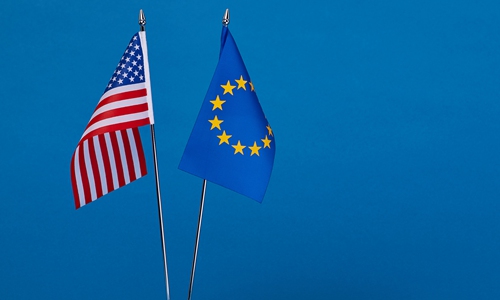HOME >> OPINION
With ties fraying across the Atlantic, will Europe realize futility of toeing the US line?
By Zhang Bei Source:Global Times Published: 2019/12/4 23:18:40

Photo: IC
The recent row between a German high-ranking official and the US is emblematic of the state of US-Europe relations.During a program on Germany's ARD TV show, German Economy Minister Peter Altmaier defended Berlin's decision not to ban Chinese telecom titan Huawei by saying his country had "not imposed a boycott" on US tech companies in the wake of the National Security Agency spying affair, when it was revealed that US authorities had tapped Chancellor Angela Merkel's phone. He also questioned the US record by saying "the US demands from its companies that they pass on certain information needed for fighting terrorism."
Clearly, Washington will not tolerate this comment. The US Ambassador to Germany, Richard Grenell, has issued a statement on the embassy website, saying Altmaier's comments equating the US with China are "an insult to the thousands of American troops who help ensure Germany's security and the millions of Americans committed to a strong western alliance," as "there is no moral equivalency between China and the US."
Though Ambassador Grenell is known for being a champion of US President Donald Trump's foreign policy, this new episode involving China is particularly revealing of a dimension of US-Germany relations and to some extent US-Europe ties. A US that puts great power competition at its heart and targets China in every way, expects its allies to fall in line. Therefore, US allies' national interests should all make way for US national interest.
But it is too high a demand for US European allies, simply because since Trump took office, Washington has done too little to make Europe happy and is therefore close to overdraft of the support and trust it built in Europe after the WWII. It is well expressed in a remark made by then president of European Council Donald Tusk, "With friends like that, who needs enemies" and in the comment by French President Emmanuel Macron, NATO is "brain dead" as US is "turning its back on us."
However, the US is clearly still unaware of the level of damage it has done to its alliance with Europe. It is quite true that with security consideration weighed in, the US still has commanding influence over Europe, however its moral standing has depleted in the continent as well as the world in the last couple of decades.
It is a trend going on for quite a while but clearly exacerbated by Trump. Most of the time after the WWII, the US-Europe alliance has been anchored by a shared goal, which was combating the Soviet Union. After the end of the Cold War, a narrative was created - the US-Europe alliance is a three-in-one relationship, built upon security cooperation, woven together by economic interdependence, and bonded by shared values, which in their opinion denote "universal values."
Though the security cooperation is in reality intact, the other two pillars are under assault from no one but the US itself. Economic interdependence, which is measured by trade and investment volumes, used to be a good thing, but since Trump assumed office, it is no longer relevant, trade deficit is what truly matters.
Thus EU, Germany in particular, is not that friendly anymore. The US has lost its moral compass in other parts of the world from time to time, but Europe was not directly affected. Since Trump took power, Europe has met the moral decline of the US head on, be it withdrawal from the 2015 Iran nuclear deal or the Paris climate deal.
What's more, the US has shown a tendency of browbeating Europe over the security connection. Former head of US Homeland Security Tom Ridge once said if the UK uses Huawei equipment for its 5G network, intelligence sharing with the US will be harmed.
The situation has forced Europe to grow up. It is true that there are still quite a lot of ideological Atlanticists who believe in the moral perfection of the US-Europe alliance itself and who expect transatlantic relations to go back to the honeymoon period once there is a new occupant of the White House. But there are more and more pragmatic Atlanticists who know that the security aspect of the US-Europe alliance is still valid and important for Europe, but the continent needs to look after its own interests.
To make decisions that suit its own interests regardless of diktats from Washington is what many European countries have opted for in the case of Huawei and 5G, because the volatility of the Trump administration is a harbinger of a changing world, in which only self-help is best for the long run.
The author is an assistant research fellow at the Department for European Studies of Beijing-based China Institute of International Studies. opinion@globaltimes.com.cn
RELATED ARTICLES:
Posted in: VIEWPOINT